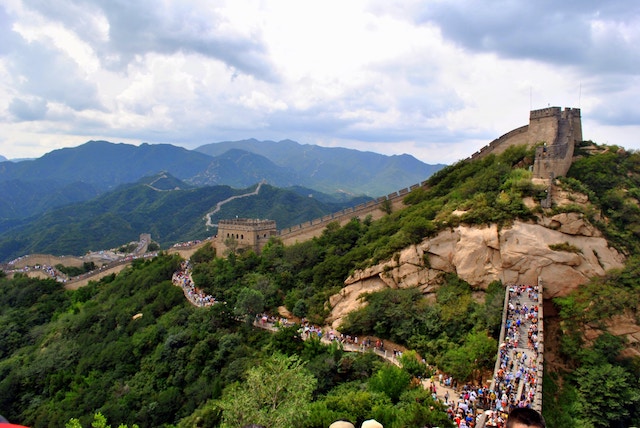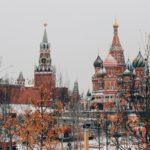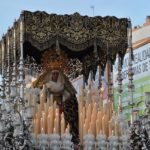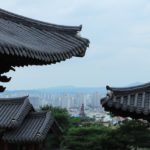What are the Boundaries between Religion and Democracy in China?
I spent a lot of this year in churches. In my foreigners-only church, we sit in the small front chapel of a Chinese church and listen to the pastor, whose name is actually Shane Sauce (his wife’s name is Star Sauce… really though), preach. We sing worship songs with the choir. We stand on our feet and clap, and sometimes we cry. And there is always prayer.
In Hangzhou’s Catholic Church, the Mass in Chinese is totally incomprehensible to me. But I mumble the parts I know at what I think are the right times. These churches are always packed. Sometimes there is only room to stand, and sometimes they set up chairs in the lobby.

Then there is the family church. I only went once, but it was enough to open my eyes to how much Evangelical Christianity has imprinted itself on the Chinese church. The people coming up to be baptized after hearing one sermon, women kneeling with tears in their eyes, the booming preacher’s voice… it felt so much like that Church of God church in east Tennessee.
It’s not always easy to expose yourself as a raging queer in a room full of Fundamentalists who you consider your friends.
I’ve spent a lot of time this year at my bible study group. Sometimes I speak up when the message is so saturated with patriarchal values I can’t stand it, and sometimes I just observe. It’s not always easy to expose yourself as a raging queer in a room full of Fundamentalists who you consider your friends.
My personal beliefs aside, I love going to church just to see the emotions play out. I love the worship music, the harmonies, the people dancing in the aisles and hugging each other, and the love and community shared between people.
Christian Smith writes in his 2007 article “Why Christianity Works: An Emotions-Focused Phenomenological Account” that the “internal logic of doing Christianity persistently produces events, interactions, and feelings in and among people compelling enough to keep the tradition flourishing despite many countervailing forces.” (Smith, 2007, 167) According to Smith, Christianity gives believers a community, a moral structure, a perceived relationship with a loving and personal creator, and experiences that transcend the self.
I have found that for many Chinese Christians, Smith’s evaluation rings true. The Christians I have met here place high value on their community, their relationship to God, a system of morality, and emotional experiences that take people out of their ordinary lives.
Religious activity outside of state-sanctioned religious spaces is explicitly illegal in China.
One day I was hiking up the mountain behind campus and stopped for a breath. I noticed two women standing very still. One was looking back and forth down the street as if searching for someone. The other had her eyes closed and hands clasped. I didn’t hear much of what she said, except for one word that contextualized the whole scene. “Yesu.” There is a chance that I didn’t understand what I was seeing, but based on my knowledge of religion in China, I assumed that the two women were subtly praying in public.
Religious activity outside of state-sanctioned religious spaces is explicitly illegal in China. Although at first glance this might seem like evidence for the popular American idea that China is a scary Communist dictatorship with no freedom, I found that at least one religious person in China sees this law quite differently. I interviewed the head Imam of Hangzhou’s Phoenix Mosque about his work and his faith. He told me that Hangzhou has about 20,000 Muslims but that the Phoenix Mosque only holds a few hundred. In response to this problem, the Hangzhou municipal government is building a new mosque that will hold 4,000 worshippers.
I was surprised by the government’s willingness to take on such a project, since it seems a little contradictory that the officially atheist state would build a house of worship. The Imam then asked me if anything like this mosque project would happen in the United States. I answered that it was unlikely the government would build a house of worship, and in fact such mixing of state and religious power is basically unconstitutional. He told me that the Chinese way was more democratic, since the government was representing the people’s wishes by building them a new mosque.
If this ethnically Hui, religiously Muslim, nationally Chinese man sees democracy in his municipal government building him a mosque, who am I to tell him he is wrong?
This moment was what Global College students start talking about and then end the conversation with, “I mean, Global College.” We have so many paradigm shifts in this school that I’m not sure we even still have solid paradigms. Still, to totally turn my thinking about what democracy means on its head made me question how I look at my own culture. If this ethnically Hui, religiously Muslim, nationally Chinese man sees democracy in his municipal government building him a mosque, who am I to tell him he is wrong?
I started to think about the two women quietly, and illegally, praying on the steps to the mountain. What was so harmful about their actions? Why did public prayer need to be curtailed by the evil Communist government? Yet I too think religious power needs to be controlled. Every year at the Chicago Gay Pride Parade, hecklers claiming to be Christians scream at us to repent or we will literally burn in hell forever. Do I really want those people at the parade?
In American democracy, we have the right to say horribly mean things whenever and wherever we want as long as they don’t constitute assault. Sometimes those things come in the form of public prayer. So these two experiences together showed me that democracy actually does exist in China for many people. The mental block for Westerners is that Chinese democracy looks like a municipal government making all the decisions about where you can pray, and then paying for a beautiful new building for you to pray in.








